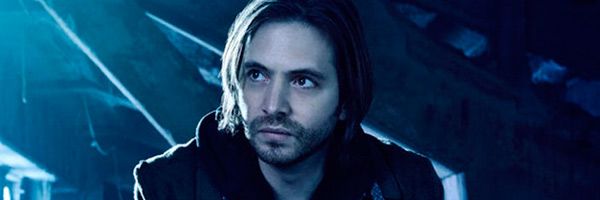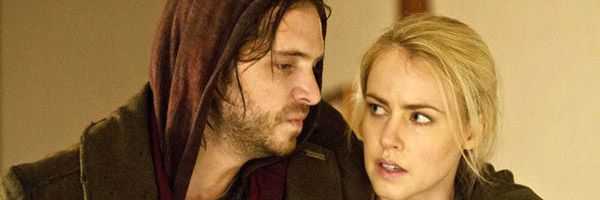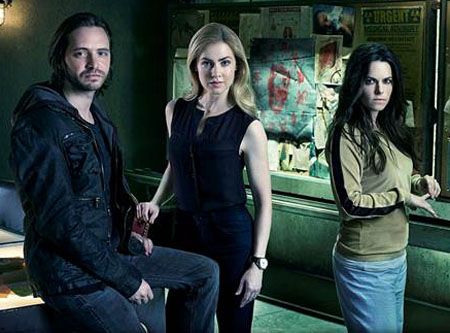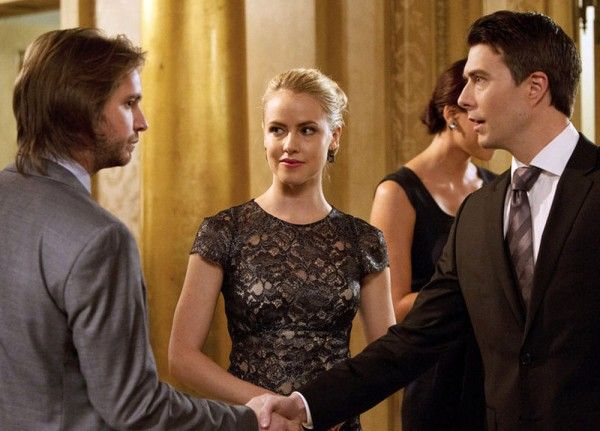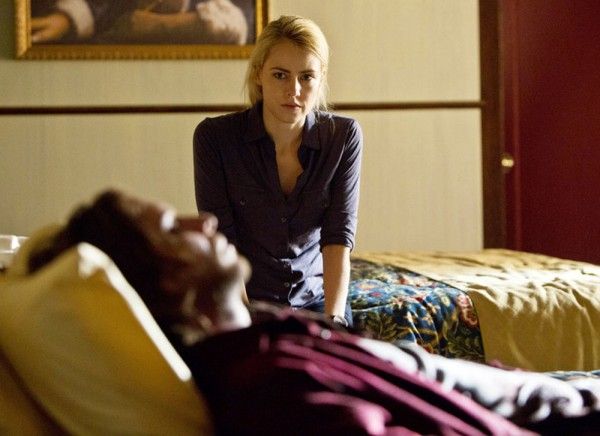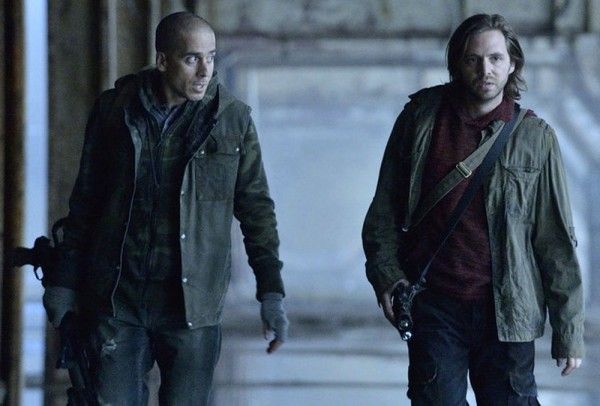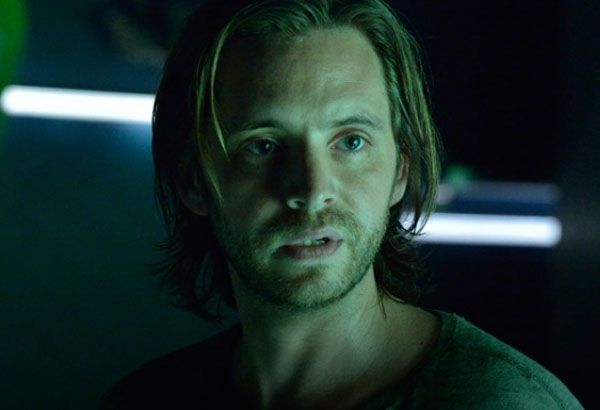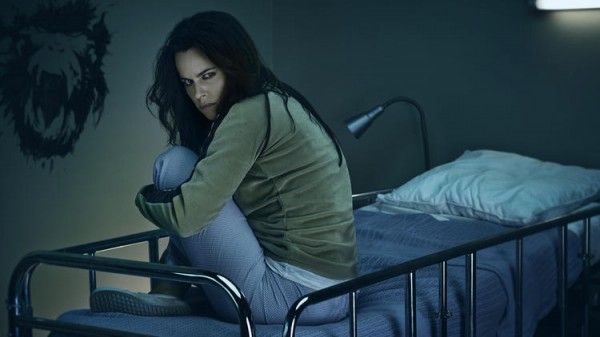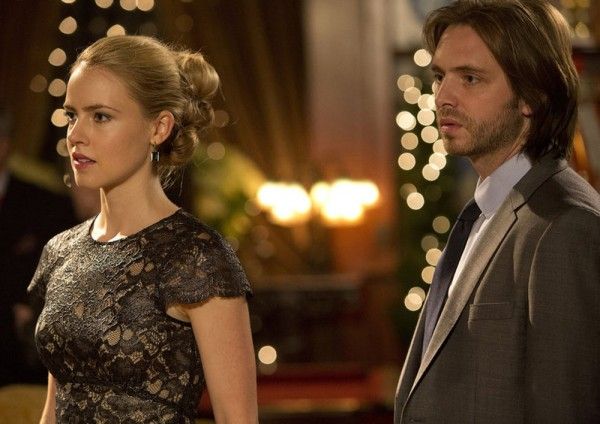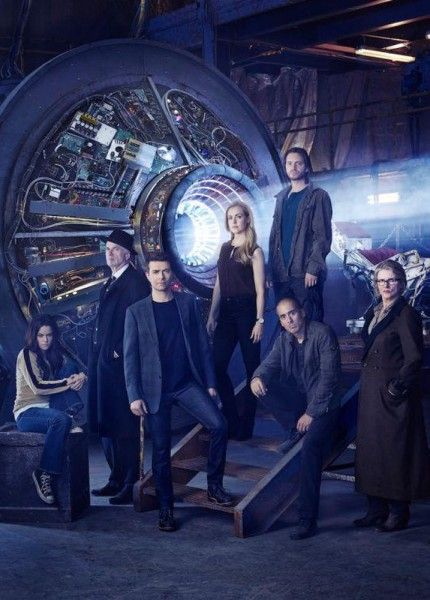12 Monkeys has been one of this years great surprises. It's a clever, unique take on time-travel packed with action, excellent performances and keen storytelling. Building on the bare-bones premise of the cult film, the series follows James Cole (Aaron Stanford) as he travels through time on a mission to prevent the apocalyptic pandemic set off by the Army of the 12 Monkeys. As he jumps from year to year, Cole encounters Dr. Cassandra Reilly (Amanda Schull), a virologist caught up in Cole’s Mission, and Jennifer Goines (Emily Hampshire) a mental patient harboring the secrets that could save the world, both of whom play a critical role in the future of the human race.
I recently had the opportunity to interview the season-one showrunner Natalie Chaidez. We talked about what showrunner's job entails, successfully running the first season, and what series creators Terry Matalas and Travis Fickett get right about time travel. We also talked about her upcoming show Hunters and fangirling over Gale Anne Hurd.
I think it was really once people started paying attention to The Walking Dead changing showrunners that the idea of a showrunner came to public attention, but I don't think a lot of people really know what a showrunners job is. So take me through what it is you do.
CHAIDEZ: Yeah, so a showrunner is the boss of a TV show. So most showrunners are writers and started out as writers, so you're in charge of everything from every script the entire season creatively, you're in charge of all the hiring, you're in charge of all the cast and crew, the budget, which is a big shock when you become a showrunner. Every decision that's made on the show. Everything from what your set looks like to what you're eating for lunch, all the decisions macro and micro are all the showrunner's decision. It's a huge, more than 24-hour-a-day job.
So, tell me how you became the showrunner for 12 Monkeys. What was the transition like from writer to showrunner?
CHAIDEZ: I've been a TV writer for 21 years and have worked on all kinds of great shows. I worked on Heroes, I worked on Sarah Connor Chronicles. Many, many, numerous credits. I was writing a pilot for Gale Anne Hurd at SyFy two years ago and in the midst of that development process, after I had written that pilot, which was called Hunters and is now getting picked up to its own series, I was asked to come in and oversee Terry Matalas and Travis Fickett who wrote the pilot. It was my first time showrunning, and it's just been the greatest experience. And a lot of it has to do with my partnership with Terry and Travis.
Because sometimes I'll go off and do my own show and I'll also be the showrunner. In this case, because Terry and Travis had less experience in TV, they wanted someone to come in who had more years under the belt and I was partnered with them. That doesn't always work, but in our case it worked like gangbusters. It was love at first site and we had a great season together. I think that it shows. I think the comradery that we felt and the love for the material and our fondness of each other, I really think it came through.
Yeah, I probably should have told you that I love the show.
CHAIDEZ: Oh, thank you!
I did the set visit for the show and I've interviewed those guys a couple times. They're kind of awesome.
CHAIDEZ: Yeah.
How did you guys collaborate together to create what I watched and loved? What was your process like?
CHAIDEZ: The project that eventually turned into 12 Monkeys, they had written as an original project called "Splinter". They were never hired to write a pilot of 12 Monkeys, and they will say in interviews that if someone had come to them and asked for a pilot of 12 Monkeys they would have said no, because it's so daunting. So they wrote a pilot called Splinter that was retrofitted into a 12 Monkeys pilot. They had already spent a year developing that pilot, developing the material when I was brought on, so when I was brought on they had a bunch of material for season one that we then dove into together and worked in various little offices across the valley and really conceptualized the first season, and created a really good roadmap for the first season that really stuck. I mean, the things that we did early on before the season started, the three of us, really stuck and became the spine of our season.
So that was our collaboration, and we really stuck together and made decisions as a unit. Because the biggest thing that can take a show down is divisiveness amongst the upper ranks. So we made a decision early on that we were not always going to agree, but be a united front for our show, and we really stuck to that. So everything from casting together to writing to breaking the stories to going to post, we really worked tightly as a team and as partners. It was just a great part of why season one went really smoothly.
What about the moments that you didn't agree on something? What was the deliberation like?
CHAIDEZ: It could be pretty vocal between Terry and Travis. Terry and Travis are best friends. They've been best friends since college. They can some pretty vocal creative disagreements that can take a little time to cool down, but I think that passion for the project - if we didn't care that much, the show wouldn’t be that good. So it can be screaming, it can be debate, it can be emails, "You are wrong, and I am right", but ultimately we would work to find a solution that usually made the three of us happy. I can think of very few decisions along the way, maybe 10-20% where it was just like, "Ok, I'll go along with it." It made us work harder to make a decision that made all three of us really happy creatively. It was good. I'm peeling off to do my own show and I'm going to miss them. I really wish they could go work with me on it, but they got to do their thing and I've got to do mine.
Tell me about casting this, because not only is it a challenge to fill the shoes of "the Brad Pitt role", but casting Aaron, he's definitely not the "Bruce Willis" type.
CHAIDEZ: Again, I credit Terry and Travis who had worked with Aaron on Nikita and brought his name up in the process. And he isn't your typical square-jawed lead, but what Aaron does is bring a truth. You believe everything he does, and he's an everyman. He's not intimidating, he's a sensitive actor and a vulnerable actor, too. Not that he isn't strong, but he draws you in - of course Bruce Willis is incredibly charismatic, but he's just a different take on the character that I think is really compelling and I think makes our show stand out on TV. He's a different looking actor, a different style of actor. With Emily, again, I credit Terry and Travis, who wanted to cast a female bcause the "Brad Pitt part" is just so daunting and iconic in sci-fi that for someone to come in and try to live up to that part was really intimidating. So Terry and Travis came up with the idea of casting a female and as soon as Emily walked through the door I think we all knew she was the one. She's unexpected, she's funny, she's dangerous, she's smart, and she just had all the characteristics that we wanted in Jennifer Goines.
Which character did you cast first?
CHAIDEZ: Cole and Cassie were cast first, so Aaron Stanford and Amanda Schull were cast first. Then Jones, and Barbara Sukowa was also in the pilot. Emily didn't come in until the second episode, so we shot the pilot six months before we went to series, so she was cast six months later.
It's a wonderful age we live in that shows can be 13 episodes long. How much of a difference does that make bearing in mind your history writing on network shows?
It feels attainable. It feels like you can really crack - an order of 12 of 13, as opposed to an order of 22 feels much more attainable. You can hand craft every episode a little more carefully just because time allows. It's just a little bit of an easier lifestyle for a writer/producer. It's never easy. Showrunning and writing are never easy, but 22 episodes, there's no break at all, whereas 12 or 13, you have a bit of a hiatus and a bit of time to reconceptualize and think about the next season. I was eager to do a 12 or 13 order, and indeed I found them just as fun. I like it. I love it.
It's a pretty popular opinion, I'm certainly not a revolutionary saying this, but I enjoy that run much more as an audience member.
CHAIDEZ: That's interesting. Because I think you feel so daunted when you have to catch up with a show and you have to jump in, something that's even - Black Mirror let's say - that's six episodes and you can get through it in a weekend, whereas if you try to catch up with Arrow, which is a brilliant show, but it's daunting after two seasons to try to watch 50 episodes, or whatever.
Also, I like Arrow, but invariably there are episodes that don't feed the larger story line and you guys don't have to do that.
CHAIDEZ: Yeah, that's true. I have this theory that a good show has mostly Bs a couple of As, one C, and you can have a D and audiences will stick with you, but you're right, that's kind of a network season. An audience will stick with you, but in cable they all have to be As and Bs. Yeah, the thought of going back to 22 is scary.
Is your new show a 22?
CHAIDEZ: No, it will be 13. It's straight to series.
What really stands out to you about the way that Terry and Travis approach time travel?
CHAIDEZ: This is going to sound odd, but the fact that it wasn't too tightly defined; the idea that the characters are discovering at the same time as the audience, I thought was really brilliant. There's a lot of things that are brilliant about what they did. The other idea that Terry and Travis did is that in the movie, you're stuck in your fate. You can try to change it, and you are unable to break out of that, which is kind of a hopeless, maybe romantic, but also a hopeless idea. So what Terry and Travis did in setting up the series is that you can change the future. Will that idea be challenged over the course of the series? Yes? It's challenged as soon as the pilot, because he shoots Goines and it doesn’t work, but that idea that we can go back, that we can fix things, that our fate isn't set, that an awful thing that has happened can be redone, I think that's really appealing to us not just narratively, but as humans. We all kind of long for that. We all have that thing that's like "I wish I could go back and fix that". But should you? Just because you can fix it, should you? I think that notion of changing the set up of time travel from the movie to the series was really appealing and smart.
What I really appreciate about the series is that it doesn't brush those issues aside. It asks the hard questions. Even in the face of human extinction, is it right to kill an innocent?
CHAIDEZ: Yeah, exactly! They're tough questions. We enjoy watching these questions play out in allegory because we experience it in our daily life with small things. Should I cross the room to say hi to that person I don't like? Should I let the lady have my seat? All the small moral decisions add up to something greater, and the idea that we would have to make a small bad choice for the greater good, or a big bad choice. How far would we go? How much would you compromise to do what's right? It's a question we all face on a micro level so to watch it play out on a micro level, those ideas appeal to us because it's something that we wrestle with as humans, as people.
So, before I run out of time with you, tell me about Hunters.
CHAIDEZ: It's a completely fresh take on the alien genre. Gale Anne Hurd is executive producing and what I really want to do is take on terrorism in an allegorical way, take on one of the toughest issues of our time. I think it's what sci-fi can do best. It allows us to step back and look at the big questions of our time in a way that isn’t as threatening, maybe. I want to make aliens scary again. There's not going to be a lot of the things we associate with alien shows that makes it familiar and trope-y. So I'm really eager to dive into the world and take on paranoia, suspicion, otherness and all those questions. Just on a side note, I'm over the moon to work with Gale Anne Hurd. I'm the biggest fan, I have the biggest crush on her. I can barely speak around her, because she's produced some of my favorite movies of all time. Particularly as a female writing in sci-fi. She's an icon to me, and to be able to work with one of the best producers of all time that happens to be a female is pretty awesome.
Yeah, she has such a presence. The first time I interviewed her I felt like, "I'm such a twerp and you're so amazing!"
CHAIDEZ: Me too, I felt the same way! But she's a brilliant producer. She came up with Roger Corman as a hands-on, on-set producer and she just knows her shit inside and out, and has so much to offer. She has the highest rated show on cable television and just brings so much to the table in so many ways, and is so knowledgeable and passionate about the project. It's a delight. It's a gift.
With you showrunning and her producing, is this a show that will address gender dynamics a lot?
CHAIDEZ: Definitely. I can't talk about it without spoiling too much about the aliens, but the ideas that are raised in Left Hand of Darkness, some of that will be explored.
Awesome.
CHAIDEZ: If you read that you know where I'm going.
Absolutely.
CHAIDEZ: I don't want to say too much, but I definitely have a strong female lead. Can't say too much, because there are some surprises there, but yeah, that's definitely a priority for me. All that stuff that sci-fi lets us talk about in a safe non-threatening way.
12 Monkeys airs Friday nights on Syfy.

